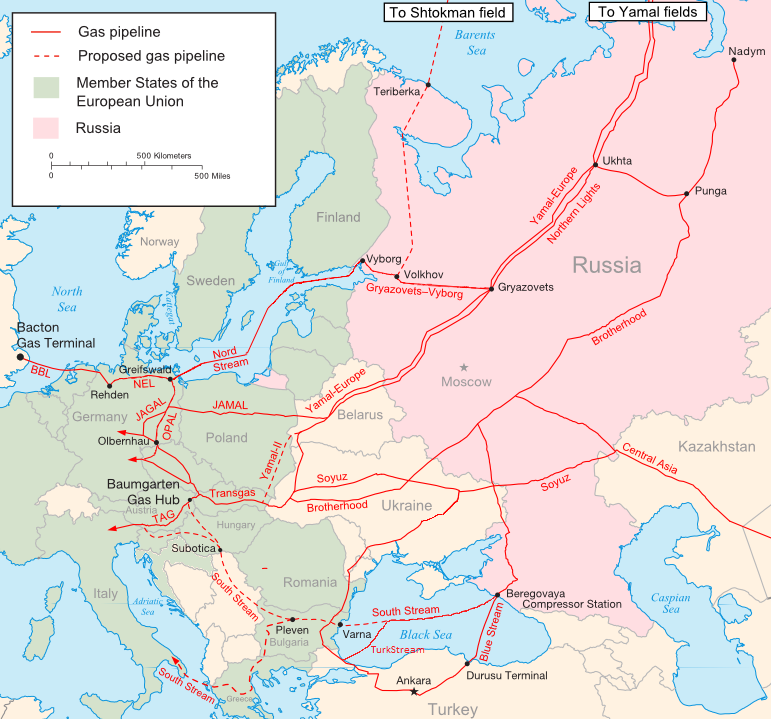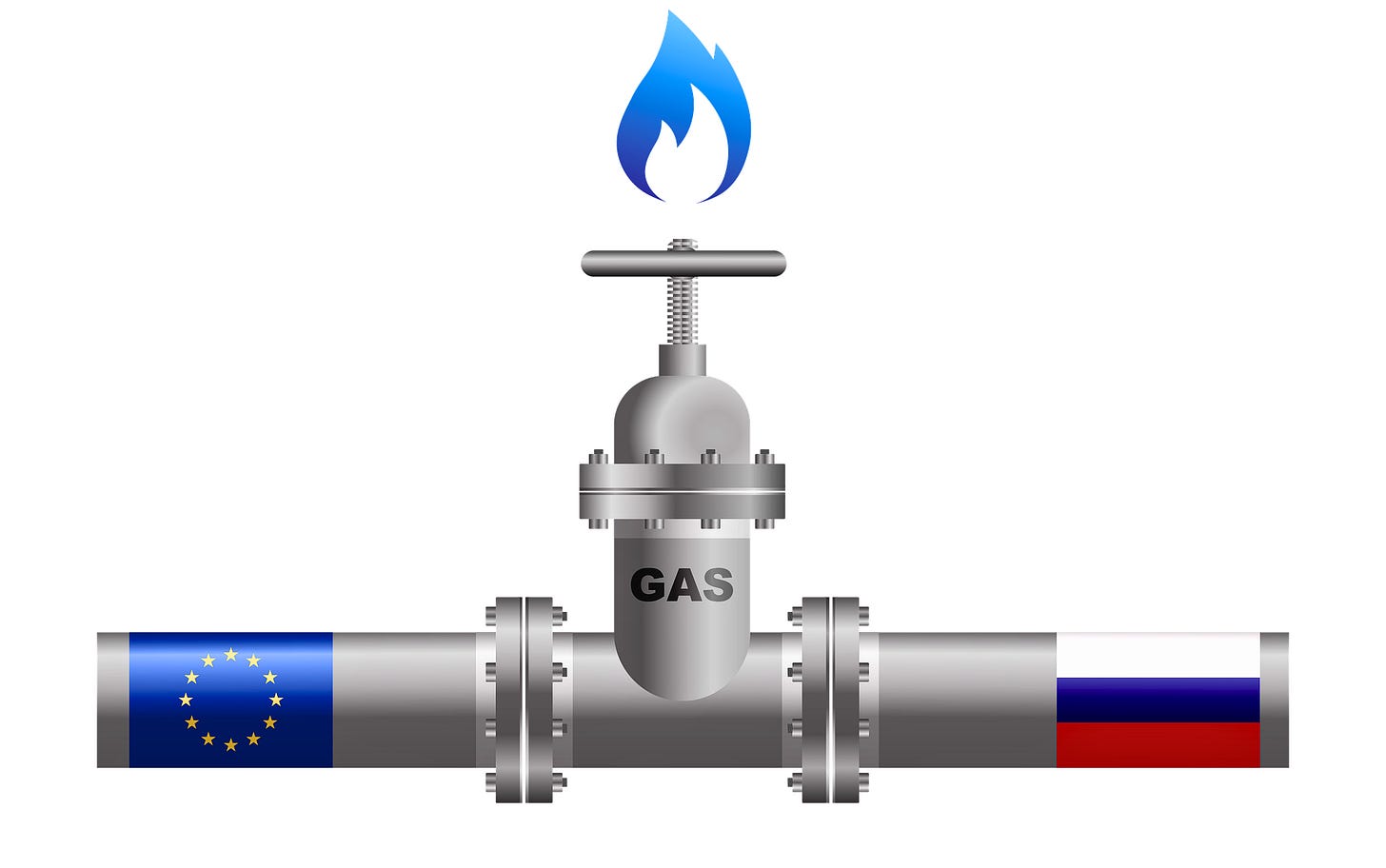Resuming Russian Pipeline Gas Sales to the EU
If Russia-Ukraine peace talks gain traction, partial gas transit resumption could be explored, likely under stricter conditions and on a smaller scale than before.
Overview
As European leaders explore ways to address the ongoing war in Ukraine, the possibility of resuming Russian pipeline gas exports has emerged as a key discussion point. Proponents argue that reopening gas flows could help lower energy costs, provide economic relief, and incentivize Moscow to negotiate for peace. However, the idea is met with staunch opposition from Ukraine’s closest allies and a segment of EU policymakers who view it as a strategic risk that could weaken European energy independence and embolden Russia.
Key Developments
Economic Pressures and Industrial Impact
High energy costs, particularly for industries reliant on gas, have led some EU member states—most notably Germany and Hungary—to advocate for resuming Russian imports. Heavy industries, such as manufacturing, chemicals, and steel production, have suffered from high input costs, making European goods less competitive globally. The rising costs of raw materials and energy-intensive production have led to job losses, factory shutdowns, and increased concerns over the deindustrialization of certain regions. These countries argue that cheaper gas could provide much-needed economic stability, prevent further industrial decline, and ensure the survival of essential sectors that drive employment and economic growth.
Geopolitical Risks and Strategic Concerns
Opponents of reopening Russian gas flows, particularly Eastern European nations and the European Commission, warn that doing so would increase European dependence on Moscow and provide the Kremlin with a key economic lifeline. The move could also undercut Ukraine, which has actively worked to reduce Russian influence over its economy and energy systems. Additionally, allowing Russia to resume significant gas sales to the EU may weaken existing sanctions and embolden Moscow to continue its aggressive policies. There is also concern that European energy reliance could be exploited by Russia as leverage in future diplomatic or military conflicts, reinforcing the bloc’s vulnerability in times of geopolitical crises.
U.S. Pressure and the Global LNG Market
The United States has been vocal in discouraging European reliance on Russian energy, advocating instead for increased LNG imports from American suppliers. The U.S. sees this as an opportunity to strengthen transatlantic energy ties while limiting Russia’s economic power. However, U.S. LNG is significantly more expensive than Russian pipeline gas, leading to tensions between economic and strategic priorities within the EU. Some European industries have voiced concerns that prolonged reliance on costly LNG could lead to higher operational costs, reduced competitiveness, and potential economic stagnation. Additionally, U.S. LNG exporters have expressed worries that a return to Russian gas transit could undermine their long-term contracts and investments in European markets, leading to uncertainties in supply commitments.
Gas Transit, Infrastructure, and Current Supply Routes
Since Ukraine and Russia’s gas transit agreement expired on January 1, 2025, Russian pipeline gas to Europe has been largely halted, with TurkStream via Turkey remaining the only operational conduit. Prior to this, Ukraine played a significant role in transiting Russian gas to the EU, benefiting financially from transit fees. While some leaders argue that resuming transit could provide Ukraine with much-needed revenue, the feasibility of restoring flows depends on the stability and security of Ukraine’s pipeline infrastructure, which has been affected by the war. Furthermore, Ukrainian officials remain cautious about any agreement that could inadvertently strengthen Russia’s position while weakening Ukraine’s own efforts to secure energy independence and alternative revenue sources.
EU Energy Policy and Long-Term Goals
The EU has drastically reduced its reliance on Russian gas, cutting imports from 45% in 2021 to 20% in the third quarter of 2024. The bloc aims to fully eliminate Russian fossil fuel imports by 2027 as part of its broader energy independence strategy. However, achieving this target requires continued diversification of supply sources, expansion of renewable energy, and political consensus—factors that remain complex and evolving. The development of alternative energy infrastructures, such as increased LNG terminals, hydrogen energy projects, and domestic renewable energy expansion, has gained momentum but still faces technical, financial, and regulatory hurdles. Balancing the need for immediate economic relief with long-term strategic objectives remains a key challenge for policymakers.
Future Possibilities and Strategic Considerations
Nord Stream Pipeline: Despite being inoperative, discussions around reopening Nord Stream remain politically charged, with strong opposition from Poland and the Baltic states. The damaged infrastructure from previous sabotage incidents further complicates the feasibility of this option.
Yamal-Europe Pipeline: Poland’s firm stance against Russian energy imports makes this route an unlikely candidate for resumption. Polish officials have reiterated their commitment to energy diversification and have strengthened agreements with alternative suppliers, including Norway and the U.S.
Ukrainian Transit: Some officials speculate that a peace deal between Russia and Ukraine could open discussions on limited Russian gas transit via Ukraine, providing Kyiv with transit revenue while maintaining some EU diversification efforts. However, any such arrangement would likely require strong security guarantees and international oversight to ensure Ukraine’s sovereignty is not compromised.

Implications
Deep Divisions in the EU: Economic concerns clash with geopolitical strategies, creating internal tensions between energy security advocates and those prioritizing lower costs. Some nations, like Germany, emphasize economic stability, while others, such as Poland and the Baltic states, stress the risks of dependency on Russia.
Energy Prices and Market Stability: Reopening Russian gas supplies could reduce energy costs for European industries and households, boosting economic growth. However, it would also strengthen Moscow’s financial position, potentially allowing Russia to fund further military actions or political maneuvers in the region.
Long-Term Energy Strategy: A shift back to Russian gas could slow Europe’s transition to renewable energy and delay energy independence. Policymakers would need to balance short-term economic relief with long-term energy security goals, including investment in green technologies, hydrogen energy, and nuclear power.
Potential U.S.-EU Trade Tensions: The U.S. may respond with diplomatic and economic pressure if Europe resumes reliance on Russian gas, potentially affecting LNG agreements and leading to trade disputes. The impact could extend beyond energy markets, influencing broader U.S.-EU trade relations.
Ukraine’s Economic and Strategic Position: If Ukraine allows gas transit, it could regain crucial transit fee revenues, providing much-needed funds for post-war reconstruction. However, this decision may complicate Ukraine’s efforts to sever economic ties with Russia and could strain its relationships with Western allies who favor total energy decoupling from Moscow.
Looking Ahead
The debate over Russian gas imports remains highly complex and politically charged. While economic realities may push some EU nations toward reopening discussions, broader security and geopolitical concerns continue to drive resistance. If peace talks between Russia and Ukraine gain traction, the possibility of partial gas transit resumption could be explored, though likely under stricter conditions and on a smaller scale than before.
Europe’s long-term energy independence remains a priority, and how these negotiations unfold will depend on economic pressures, diplomatic efforts, and evolving geopolitical dynamics in the coming months.





Thanks. Your articles are succinct and handy.
Ukraine's energy capacity now at one-third. Warmer weather than expected, but that won't last, and more bombs will arrive, especially now that Russia seems more on the offensive the past 24 hours. If the USA doesn't loan overpriced gas, Zelensky will be forced to reopen the pipe.
Less profit for Russia selling gas via Turkey.
Peace process will only begin when USA believes more bucks to be made out of reconstruction and plundering real estate. Of course, current terms are ridiculous to Russia.